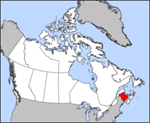 |
|
New Brunswick is bounded on the north by Quebec's Gasp Peninsula and by Chaleur Bay. Along the east coast, the Gulf of Saint Lawrence and Northumberland Strait form the boundaries. In the south-east corner of the province, the narrow Isthmus of Chignecto connects New Brunswick to the Nova Scotia peninsula. The south of the province is bounded by the Bay of Fundy, which has the highest tides in the world with a rise of 16 m. To the west, the province borders the American state of Maine.
New Brunswick differs from the other Maritime provinces physiographically, climatologically and ethnoculturally. Both Nova Scotia and Prince Edward Island are either wholly or nearly surrounded by water and oceanic effects therefore tend to define their climate, economy and culture. New Brunswick on the other hand, although having a significant seacoast, is sheltered from the Atlantic Ocean proper and has a large interior which is removed from oceanic influences. The climate therefore tends to be more continental in character rather than maritime. The settlement patterns and the economy of New Brunswick also is different from its Maritime neighbours, in that it is more based on the provinces river systems rather than on its seacoasts.
The major river systems of the province include the St. Croix River, Saint John River, Kennebecasis River, Petitcodiac River, Miramichi River, Nepisiguit River and the Restigouche River. New Brunswick lies entirely within the Appalachian Mountain range. The New Brunswick Lowlands form the eastern and central portions of the province. The Caledonia Highlands and St. Croix Highlands extend along the Bay of Fundy coastal region, reaching elevations of more than 300 metres. The northwestern part of the province is comprised of the remote and more rugged Miramichi Highlands, as well as the Chaleur Uplands and the Notre Dame Mountains with a maximum elevation at Mount Carleton of 820 metres. The total land and water area of the province is 72,908 km, over 80% of which is forested. Agricultural lands are found mostly in the upper Saint John River valley, with lesser amounts of farmland in the southeast of the province, especially in the Kennebecasis and Petitcodiac river valleys. The three major urban centres all are found in the southern third of the province.

